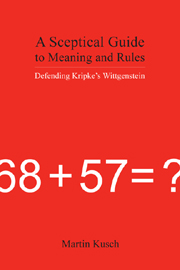Book contents
7 - Semantic primitivism
Summary
Introduction
Four of the most influential commentators on WRPL – Boghossian, McDowell, Pettit and Wright – have argued that the sceptical challenge can best be met by primitivism about meaning and content. All four philosophers present their proposals as non-sceptical, straight responses to the sceptic, and two of them even ally their suggestions explicitly with the sixth of the seven responses discussed and dismissed in Chapter 2 of WRPL. At first sight, it might seem surprising for us to investigate these views only now, two chapters after we have left behind other straight responses to the sceptic. The reason for this transposition stems from my interpretation of the sceptical solution as a form of primitivism. This interpretation naturally leads one to ask how meaning-determinist and meaning-sceptical forms of primitivism differ. It will also enable us to see that – contrary to how they present their proposals – at least three of these four philosophers do not in fact defend meaning determinism at all. Once we relate their primitivist views with our reconstructions of meaning determinism and meaning scepticism, we shall realize that they are much closer to the latter than to the former.
Primitivism in meaning determinism
Kripke formulates meaning-determinist semantic primitivism as the following view: “[M]eaning addition by ‘plus’ is a state even more sui generis than we have argued before. Perhaps it is simply a primitive state, not to be assimilated to sensations or headaches or any ‘qualitative’ states, nor to be assimilated to dispositions, but a state of a unique kind of its own” (WRPL: 51).
Information
- Type
- Chapter
- Information
- A Sceptical Guide to Meaning and RulesDefending Kripke's Wittgenstein, pp. 207 - 236Publisher: Acumen PublishingPrint publication year: 2006
